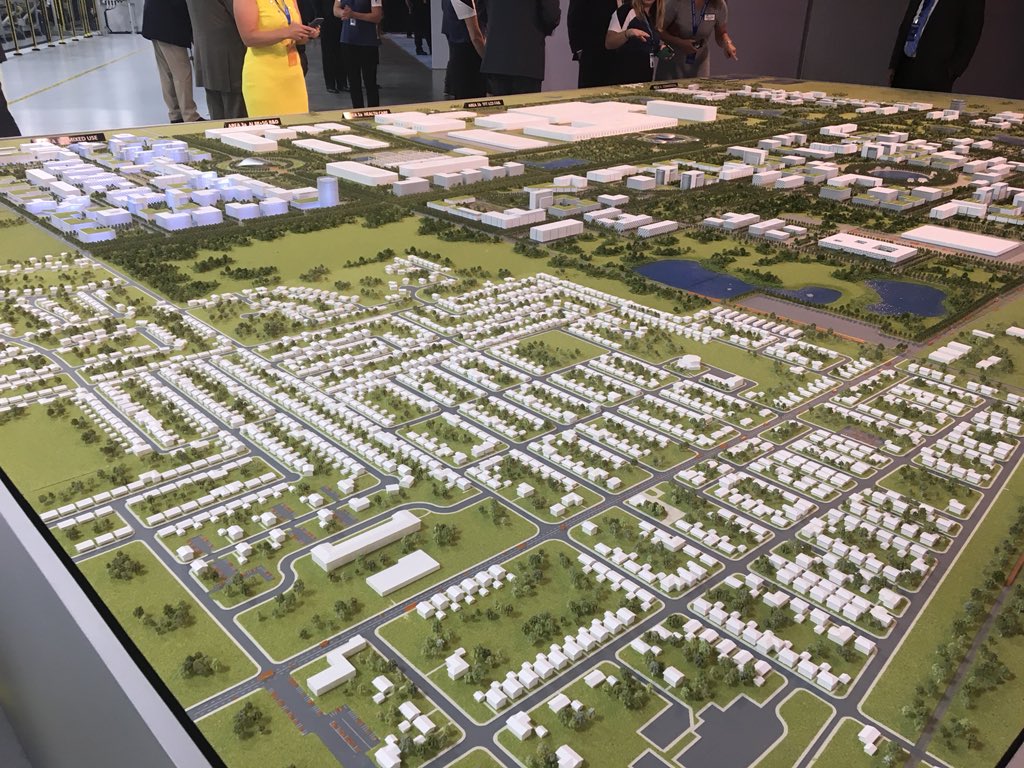Why Foxconn Contract Is In Dispute
Both sides may have reason to renegotiate contract.
For much of this year, Wisconsin officials have been trying to meet with Foxconn and renegotiate the contract that provides for large cash subsidies to be paid to the corporation if it meets certain job and spending targets. According to the Secretary of the Department of Administration, Joel Brennan, the unilateral choices made by Foxconn to build something much different and far smaller than originally promised mean that the state and Foxconn should “work together to ‘right size’ the contract through the amendment process.”
It was actually Foxconn that first suggested that the contract should be renegotiated, but it has not responded to the state’s repeated requests to put in writing how the corporation would like to see the contract changed. And in a recent letter Foxconn made it clear that it would prefer to have the state simply waive or ignore certain contract requirements relating to Foxconn’s eligibility for the annual subsidies, calling those requirements “immaterial” to the broader goals of the contract.
We learned last week from an excellent article in The Verge not only that there are significant contract disagreements between the state and Foxconn, but also that there appears to be an impasse in the efforts to rewrite key terms of the deal.
A number of factors make reviving the annual payments a long shot, but I think a new deal could be reached if Foxconn is willing to be more open about its plans, and if it isn’t simply looking for an excuse to pull the plug on its vastly reduced Wisconsin project.
This Q and A analysis examines the parts of the contract that each side should probably want to rewrite, the effects an impasse would have on total state and local subsidies for Foxconn, and some of the factors that appear to be contributing to the current impasse.
1) Which parts of the Foxconn subsidies are at stake in the contract dispute?
The contract dispute relates to Foxconn’s eligibility to receive the so-called “tax credits” that could account for as much as $2.85 billion of the total package of subsidies for Foxconn. (The “tax credit” terminology is a bit misleading since other tax breaks are expected to eliminate virtually all of the corporation’s income tax liability, which means that all or nearly all of the tax credits will be in the form of annual cash payments – paid for by Wisconsin taxpayers.) The total subsidies could reach or exceed $4.5 billion if the corporation ultimately qualifies for all the taxpayer-financed aid that the state and local governments have agreed to provide.
The debate about the contract is unlikely to affect the up-front public expenditures of more than $1 billion for land acquisition, site preparation, substantial utility upgrades, and highway improvements. The question at hand is how much more the corporation should get in the form of annual payments/tax credits – taking into account that the corporation’s revised plans are for a facility which is only one twentieth of the size of the one originally promised and will not create the cutting-edge “technology hub” described by the deal’s proponents.
2) Why should Foxconn want to renegotiate the contract?
Foxconn’s evolving plans for its Wisconsin operations bear almost no resemblance to the manufacturing operation that state policymakers thought they were subsidizing. Because of the very substantial changes in its plans – including changes in the type of manufacturing facility and in the timing of capital investments and hiring – several aspects of the contract appear to make Foxconn ineligible for any of the “tax credits” this year and could sharply reduce credits in future years. These appear to be the three biggest obstacles:
- Minimum job standards – To protect state and local taxpayers who are providing huge upfront subsidies, the contract makes eligibility for the employment tax credits contingent upon Foxconn meeting minimum benchmarks for job creation. Foxconn fell well short of the 2018 minimum of 260 jobs, and the state says Foxconn probably won’t meet the minimum for 2019 of 520 jobs. Foxconn argues otherwise, but it may be counting some of its workers in other states. A Legislative Audit Bureau report issued this week reiterates the point that credits can only be based on work performed in Wisconsin.
- Eligibility for investment credits – Under the terms of the contract, eligibility for the 15 percent state subsidy for capital improvements is tied to investments in a generation 10.5 factory, which is no longer what Foxconn plans to build. As a result, the Department of Administration has said that Foxconn does not qualify for the annual payments for the company’s capital spending.
- The role of a Foxconn subsidiary – Much of the work thought of as being done by Foxconn has recently been placed under the responsibility of a subsidiary, Fii, which is not a party to the contract. Unless the contract is rewritten or Fii submits its own application for subsidies, its expenditures for payroll and capital investments will not qualify for tax credits.
3) What are the primary reasons the state might want a new contract?
From the state’s perspective, a major flaw in the contract is that the extremely large subsidies for each job created will be even higher if the number of employees is less than originally expected (as we explained back in February). In fact, the contract is structured in a way that gives Foxconn greater subsidies per job if the company invests heavily in automation and hires just the minimum number of workers needed to qualify for the investment tax credits. Changing that aspect of the contract should be high on the state’s list of priorities.
Third, there are small changes that we suggested early this year that would preclude Foxconn from gaming how it meets the minimum job standards and payroll calculations.
4) Why did Foxconn decide that it no longer wanted to renegotiate the deal?
Back in the spring, when Republicans in the legislature were criticizing Gov. Tony Evers for suggesting that the tax credit deal should be renegotiated, Foxconn pointed out that it initiated the idea of making contract changes. But six months later, a Foxconn letter said that contract changes aren’t necessary because the specific terms of the contract are “immaterial matters” since the only “material” matters are “overall capital investment and long-term job growth.”
There are many possible reasons for the sharp change in Foxconn’s position about rewriting the contract. I can’t definitively answer the question, but I’ll offer a few potential explanations. First, it may be that over the course of the last six months Foxconn realized that it wouldn’t get a new deal without making concessions that reduce or at least hold down the subsidy per job created. The corporation may have decided that because the two sides are far apart regarding the appropriate size of the subsidies, it would make take a different approach to negotiations.
A third explanation, which may overlap with the others, is that Foxconn’s primary motivation has less to do with what it builds in Wisconsin and how profitable its new plant might be, and more to do with keeping the favorable trade status the corporation got from President Trump. Some business analysts have suggested that’s the case, and if they are right it would follow that Foxconn wants to find a way to do enough to stay in the good graces of the President, or to blame someone else if the corporation pulls the plug on the manufacturing in Racine County. Keep in mind that Foxconn executives said early this year that building a factory in Wisconsin was not economically feasible (even with huge subsidies). However, they quickly backtracked after the President made unfavorable comments.
5) What comes next?
Officials for the state and Foxconn aren’t ready to declare the contract dead. Both sides are under great pressure to revise the deal in ways that enable the project to continue. In a Milwaukee Journal Sentinel interview this week, Governor Evers said he thought that a deal could be reached and that the state wouldn’t necessarily insist that the amount of subsidy per job be reduced. In light of his statements, we should anticipate more negotiations between the state and Foxconn.
Whether the contract can be revised in a way that enables Foxconn to receive large cash payments from the state each year depends on the answers to these three questions:
- Can and will Foxconn tell the state what its plans are?
- If not, will the negotiators for the state be willing to make a new deal that is nearly as generous as the original contract (which Foxconn isn’t complying with)?
- Does Foxconn actually want a new deal, or would it prefer to have a reason to try to lay the blame on the state if the corporation decides to pull the plug on its vastly diminished Wisconsin plans?
Regardless of whether a new deal is reached, Foxconn will continue to benefit from more than $1 billion of up-front subsidies, and I expect it to continue operating in Wisconsin – at least until the next Presidential election. My crystal ball doesn’t look out any further than that.
In the meantime, the Wisconsin Budget Project will continue to track the Foxconn developments closely, and we will follow up with an examination of how the changes in the corporation’s plans should change policymakers’ thinking about the appropriate level of public subsidies.
More about the Foxconn Facility
- Foxconn Paid Mount Pleasant $15 Million Make-Up Fee in 2025 - Steph Conquest-Ware - Jan 6th, 2026
- Murphy’s Law: Total Cost of Foxconn Is Rising - Bruce Murphy - Dec 8th, 2025
- WEDC, Foxconn announce additional $569 million investment in Racine County - Wisconsin Economic Development Corporation - Nov 25th, 2025
- Foxconn Acquires 20 More Acres in Mount Pleasant, But For What? - Joe Schulz - Jan 7th, 2025
- Murphy’s Law: What Are Foxconn’s Employees Doing? - Bruce Murphy - Dec 17th, 2024
- With 1,114 Employees, Foxconn Earns $9 Million in Tax Credits - Joe Schulz - Dec 13th, 2024
- Mount Pleasant, Racine in Legal Battle Over Water After Foxconn Failure - Evan Casey - Sep 18th, 2024
- Biden Hails ‘Transformative’ Microsoft Project in Mount Pleasant - Sophie Bolich - May 8th, 2024
- Microsoft’s Wisconsin Data Center Now A $3.3 Billion Project - Jeramey Jannene - May 8th, 2024
- We Energies Will Spend $335 Million on Microsoft Development - Evan Casey - Mar 6th, 2024
Read more about Foxconn Facility here
Wisconsin Budget
-
Charting The Racial Disparities In State’s Prisons
 Nov 28th, 2021 by Tamarine Cornelius
Nov 28th, 2021 by Tamarine Cornelius
-
State’s $1 Billion Tax Cut Leaves Out 49% of Taxpayers
 Sep 21st, 2021 by Tamarine Cornelius
Sep 21st, 2021 by Tamarine Cornelius
-
TANF Program Serves a Fraction of Poor Families
 Aug 30th, 2021 by Jon Peacock
Aug 30th, 2021 by Jon Peacock






















“ A third explanation, which may overlap with the others, is that Foxconn’s primary motivation has less to do with what it builds in Wisconsin and how profitable its new plant might be, and more to do with keeping the favorable trade status the corporation got from President Trump. Some business analysts have suggested that’s the case, and if they are right it would follow that Foxconn wants to find a way to do enough to stay in the good graces of the President, or to blame someone else if the corporation pulls the plug on the manufacturing in Racine County.“
It’s always been about keeping “favorable trade status” with Trump. Call me cynical but Foxconn never intended to manufacture Gen 10 screens or anything remotely similar to that. The millions Foxconn “invested” in WI was a small price to pay to ward off any tariffs. They found a naive and vulnerable patsy in Walker and the GOP and went full out.
We all now how this is going to play out. Foxconn will blame their predicted failures on Evers and the GOP will fall in line and do the same. Foxconn will leave and the local communities who invested million in this project will look to the state for bailout. Foxconn will never repay these communities. Foxconn will litigate for years as they have the money to do so.